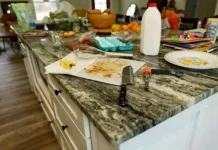Everyone feels anxious when they hear about an impending hurricane, but even an ordinary rainstorm can knock out power to a house if a tree branch accidentally falls on a power line. Most power outages last only a few hours, but a few days in a row can be severe.
Don’t expect everyone to experience a power outage.

Before you panic, check your breakers to make sure the outage is not just an overloaded circuit. Remember that most towns run on the power grid, so you could lose power while the house across the street still has power. Knowing who has electricity will help you decide what to do next.
Do not use candles.

Lighting candles during a power outage seems like a classic solution, but it is not the safest method. Children and pets can easily knock them over, and it is not a good idea to leave burning candles unattended as you move from room to room. Also, some candle holders can get hot if the candles are lit for an extended period of time. Instead, hide flashlights in key places in the house and check them regularly to make sure the batteries are still working.
Don’t leave them plugged in.

If the power goes out, walk around immediately, unplug large electrical devices such as televisions, computers, and appliances, and switch off smaller electrical devices such as lights and radios. The risk is this. When electricity is restored, power surges could damage electronic equipment and overload circuits in your home.
Do not open refrigerators or freezers.

Leaving a refrigerator or freezer closed will allow cold air to stay inside and prevent spoilage. In fact, an unopened refrigerator will keep food at the proper temperature for at least four hours, and a good freezer will keep it at the proper temperature for about two days. If it is hot during a power outage, consider wrapping these appliances in blankets to keep them warm.
Do not grill indoors.

On a cold night after a power outage, it may be tempting to bring the grill indoors to cook dinner, but that is a very dangerous practice. Gas and charcoal grills produce fumes that can lead to carbon monoxide poisoning and death if not properly ventilated. The same goes for generators. Using an outdoor generator indoors can put your family in serious danger.
Do not go near standing water.

Power outages often occur during storms. This means that fallen tree branches and power lines could be lurking under a new lake in your backyard. Even if you are tempted to go into the water to remove the branches from your car, resist the urge and give the certified crews the time and space they need to safely remove them.
Don’t let the pipes get too cold.

During winter power outages, water in pipes can freeze and expand, causing pipes to burst. Pipes in newer or recently renovated homes may be properly insulated, but in older homes, check for uninsulated pipes in basements, garages, and exterior walls, wrap them in Styrofoam, old blankets, or towels, and use small streams of water to reduce the risk of freezing.
And let’s not forget comfort.

Whether it is a windy summer day or a freezing winter night, without air conditioning you will definitely feel the change in weather. If it is hot, dress lightly, open windows, close blinds on south-facing windows, and stay out of the sun. If it is cold, bandage up and try to let warm air in. Cover leaky windows with blankets and close doors to unused rooms. If you have a fireplace, use it for heat. However, never use a gas stove.
Do not use all the water at once.

Most plumbing does not require electricity unless it is well water. This means you can use the toilet. But the hot water tank will only hold a bucketful of water. However, tanks for hot water are limited, and sewage systems use electricity to send it to the treatment plant, so it quickly overflows. Therefore, try to keep everything running for as long as possible, using showers and flushing sparingly.
Don’t let your batteries run out.

Sure, you can still use your cell phone after a power outage. But if you are tweeting about the power outage or playing games to pass the time, your cell phone may run out of charge. If that happens, what happens when you need to make an important phone call? To protect your battery, close apps you are not using, minimize apps running in the background, and take out that chess game you haven’t used since grade school.
Spread the word

Now that you know what to do during a power outage, educate your family and neighbors. Also, consider putting a piece of paper summarizing what to do in the event of a power outage on the inside of your kitchen cabinets or on the side of your refrigerator for everyone to see. It is important to always be prepared.









